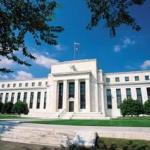
But, alas, we didn’t hear anything noteworthy. Rather, we heard a lot of hot air. What follows is a selection of several of Yellen’s choice excerpts.
“At the FOMC’s most recent meeting, the Committee judged, based on a range of labor market indicators, that ‘labor market conditions improved.’ […] Nevertheless, the Committee judged that underutilization of labor resources still remains significant.
“Given this assessment and the Committee’s expectation that inflation will gradually move up toward its longer-run objective, the Committee reaffirmed its view ‘that it likely will be appropriate to maintain the current target range for the federal funds rate for a considerable time after our current asset purchase program ends, especially if projected inflation continues to run below the Committee’s 2 percent longer-run goal, and provided that longer-term inflation expectations remain well anchored.’ But if progress in the labor market continues to be more rapid than anticipated by the Committee or if inflation moves up more rapidly than anticipated, resulting in faster convergence toward our dual objectives, then increases in the federal funds rate target could come sooner than the Committee currently expects and could be more rapid thereafter.
“Of course, if economic performance turns out to be disappointing and progress toward our goals proceeds more slowly than we expect, then the future path of interest rates likely would be more accommodative than we currently anticipate.”
A Sick Dog
What we gather from Yellen’s speech is that the Fed is just winging it on their price fixing scheme. They really have no intention of raising the federal funds rate any time. Not unless inflation forces them to.
Despite some evidence that labor markets have improved, the Fed’s not buying it. They know the economy hasn’t really recovered from the Great Recession. Although the unemployment rate has inched down, so has the labor participation rate.
A robust recovery and economic boom following the Great Recession never really came. The average rank and file wage earner has had to live with a shrinking paycheck for the last five years. On the other hand, those at the top of the economic spectrum have seen the price of their assets expand like an inflating balloon.
Those at the top have never had it so good. Yet what Yellen may or may not grasp, she certainly doesn’t mention it, is that their credit creation machine is broken. It no longer pushes credit based money into the economy.
That’s why the price inflation that should have obviously followed the Fed’s extreme policies of mass money supply inflation has yet to come. The cheap credit the Fed provides merely pumps money into financial assets. But it hardly drips into the economy…gross domestic product lurches along like a sick dog.
What a Remarkable Time to be Alive
In short, the transmission device for Yellen’s funny money malfunctioned. Rather than flooding into the economy, the new money sat on bank balance sheets or was used to buy Treasuries. At yesterday’s close, the 10-Year Treasury note was yielding just 2.39 percent.
This transmission effect, or lack thereof, in central banking parlance is called pushing on a string. The central bank pushes on one end of the string by expanding the money supply and the other end of the string, which is represented by the money’s entry into the economy, doesn’t budge. That’s why, even with all the money creation, price inflation hasn’t risen in kind.
In addition, the cheap credit no longer does the trick like it did before – from about 1940 until 2008 – to boost GDP. The magic that made Alan Greenspan “The Maestro” is gone. The economy’s capacity to support more and more debt has been surpassed.
The average job cannot pay for the average mortgage. The average starting position for a college graduate cannot dent the principle of the average student loan debt. The overall economy cannot pay out all the promises that have been made on its behalf.
But while the economy cannot support more debt, for now, the stock market continues to lap it up like a thirsty dog. Yesterday the S&P 500 eclipsed the 2,000 mark for the first time ever. Good gracious! What a remarkable time to be alive.
Sincerely,
MN Gordon
for Economic Prism
Return from What a Remarkable Time to be Alive to Economic Prism





